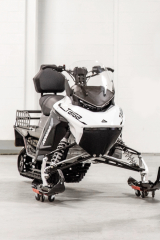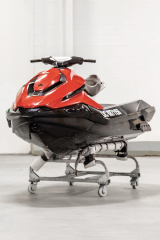Imagine inventing a 100% electric snowmobile that produces zero greenhouse emissions and zero noise. That was the crazy dream of three McGill University engineering students when they entered a business start-up competition six years ago. Now, it’s mission accomplished for Paul Achard (B.Eng. 2014), Samuel Bruneau (B.Eng. 2015) and Gabriel Bernatchez (B.Eng. 2016), the co-founders of Taiga Motors. Specialized trade magazines have already dubbed their young company the "Tesla of snowmobiles."
The trio is in the process of converting their small research centre on Dollard Street, in the Montreal borough of LaSalle, into a pilot plant. "We're testing our manufacturing processes to be able to move to large-scale production," says Achard. And that’s just the beginning: following a round of investment by Taiga that raised $10 million last fall, a Toronto investment group has just proposed investing $100 million in April to accelerate the company’s expansion.

As it happens, the first machines Taiga delivers to dealers will be.... personal watercraft. That’s the result of the three engineers’ second exploit: not only did they develop exclusive technologies powerful, quiet and clean enough to make both snowmobilers and environmentalists happy, they also made sure that their chassis, powertrains, batteries and software could be used in personal watercraft, as well.
Achard will hire 10 more employees by the end of February, after Taiga’s initial core of 20 employees doubled in 2020. Over the next two years, the number will double several times more. "Going from 1,000 to 50,000 units per year is a big leap," says Achard, who – like his co-founders – is 29 years old.
The engineering director is happy that the company has put a solid marketing team in place, as it needs to find customers willing to pay US$15,000 for a deluxe seasonal vehicle. Quebec giant Bombardier Recreational Products (BRP) remains a leader in this market, which it literally invented, and which is still dominated by combustion engines.
Interest from ski resorts
The first customers to show interest in Taiga’s snowmobiles were large ski resorts and national parks where gas-powered machines are either banned or their use strictly limited. "One combustion snowmobile produces more harmful emissions over 100 km than 12 cars. The customers who adopt our technology are the ones who are the most concerned about pollution and noise," says Achard, who sees consumer interest rising.

"I'm a cottage owner and residents here would like to ban personal watercraft because of the noise. With an electric watercraft, the only thing you hear is the turbine. It doesn't produce the annoying noise that irritates people," says Gaby Grégoire, general manager at Grégoire Sport, a motor vehicle dealer in Notre-Dame-de-Lourdes in Lanaudière. Grégoire says he was thrilled with his personal watercraft test rides last summer. "I can't wait to try the snowmobile prototype."
"Like Tesla, Taiga wants to take its time and do things the right way," says Grégoire.
The next stage
To become the Tesla of power sports, however, Taiga will need a fourth McGill alumnus, Tim Tokarsky (B. Sc. 1988), to tackle another challenge. Chairman of the board of directors, Tokarsky has led successive rounds of financing – the last of which, in the fall of 2020, raised $10 million from some 50 investors. "For the next stage, we'll need to raise at least ten times that amount," he says.
That goal is in sight, because Taiga has just accepted the offer of a Canadian special purpose acquisition corporation, Canaccord Genuity Growth II Corp., to invest more than $100 million in Taiga through a merger transaction. The transaction, expected to close in April, values Taiga at $300 million and will enable its co-founders to accelerate their production plans.
Tokarsky, a geophysicist turned private investor, got to know Taiga’s founders when they were students participating in the McGill Dobson Cup, a McGill University business start-up competition for which he was a mentor and juror. Impressed by the trio's determination, Tim Tokarsky provided the first $50,000 they needed to build a prototype.
Gains for Quebec
Although he’s happy about the growing interest of financiers, Tokarsky says he won’t be taking money from just anyone: Taiga’s investors will have to embrace the vision of its founders. “We had investors who offered to build a factory in British Columbia and in Sweden, but the guys at Taiga want to keep it here. Quebec has been good to us. We are even looking at going back to Shawinigan.”
In the long run, Tokarsky says, Quebec will get more than the few hundred jobs Taiga creates when it opens its factory – possibly in Shawinigan, but the final decision has yet to be made.
"Let's give our kids in Quebec a chance and stop burning oil. I'm from Edmonton, I'm a roughneck, I worked in the oil business, on oil rigs. Quebec is absolutely doing the right thing now by looking toward the future. Taiga will be part of that story."
